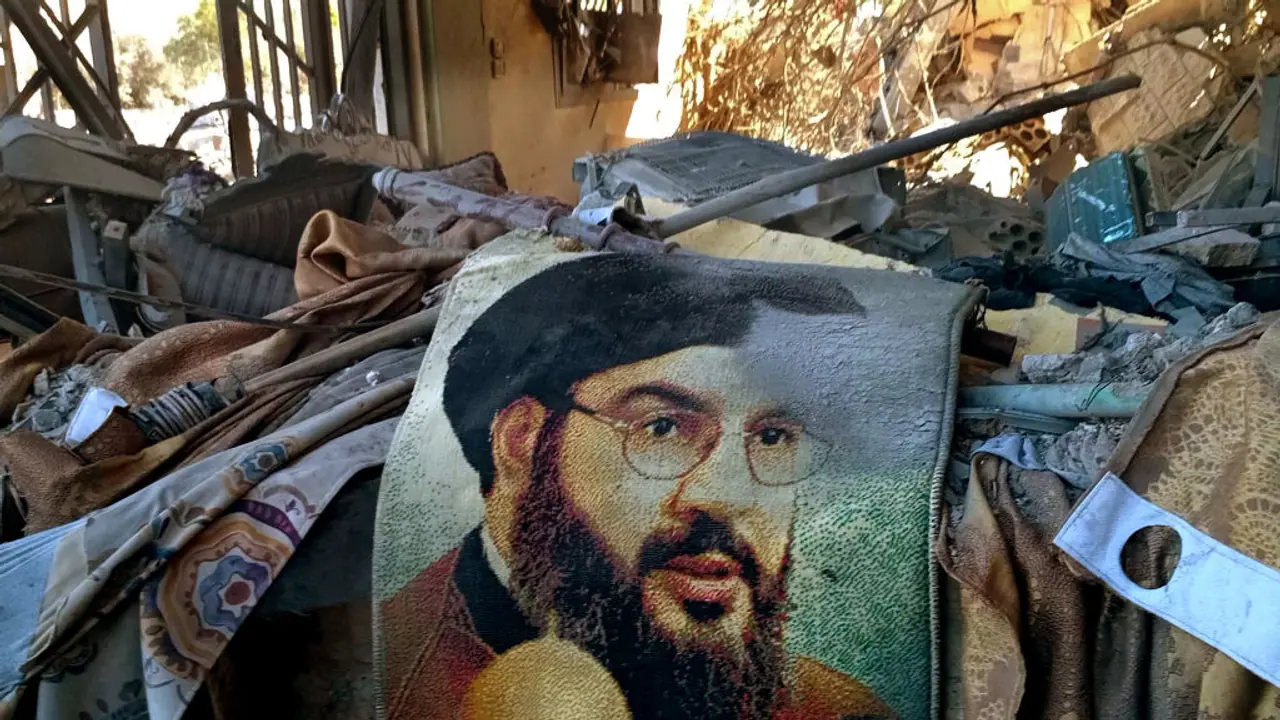Israeli forces on Saturday claimed that they successfully killed Hassan Nasrallah, the leader of the militant group, in a large-scale airstrike targeting Hezbollah’s headquarters in the southern suburbs of Beirut, Lebanon.
In a significant escalation of hostilities between Israel and Hezbollah, Israeli forces on Saturday claimed that they successfully killed Hassan Nasrallah, the leader of the militant group, in a large-scale airstrike targeting Hezbollah’s headquarters in the southern suburbs of Beirut, Lebanon. The Israeli military also stated that, along with Nasrallah—long regarded as a symbol of resistance against Israel—key founders of the group, including Ali Karchi, the commander of Hezbollah’s southern front, were eliminated in the strike on Friday.

"Hassan Nasrallah will no longer be able to terrorize the world," wrote the Israel Defense Forces in a post on X.
"This is not the end of the toolbox. The message is simple, to anyone who threatens the citizens of the State of Israel - we will know how to get to them," said Lt. Gen. Herzi Halevi while announcing the death of Nasrallah.
The airstrike, described as one of the most significant Israeli operations in recent months, devastated the Dahiyeh area, a well-known Hezbollah stronghold. At least six people were confirmed dead, and 91 others were injured, with rescue teams still working to retrieve bodies from beneath the rubble.
The Israeli Defense Forces (IDF) reportedly used bunker-buster bombs in the strike, indicating a calculated effort to penetrate Hezbollah’s fortified underground infrastructure.
"The IDF spokesman announces that yesterday, the IDF killed Hassan Nasrallah, the leader of the terrorist organization Hezbollah and its founders, along with Ali Karchi, the commander of the southern front in Hezbollah, and other commanders in Hezbollah," the IDF said in a statement on Saturday.
"Fighter jets of the Air Force under the precise intelligence guidance of the intelligence wing and the defense system, attacked the central headquarters of Hezbollah, which is located underground, under a residential building in the Dahiyeh area of Beirut. The attack was carried out while the top brass of Hezbollah were at the headquarters and engaged in coordinating terrorist activities against the citizens of the State of Israel," the statement further added.
Nasrallah’s death marks a significant turning point in the long-running conflict between Israel and Hezbollah, which has seen repeated escalations over the years. As the head of Hezbollah since 1992, Nasrallah was a key figure in orchestrating military strategies and operations against Israel. His assassination is expected to provoke a strong retaliation from the group, raising the specter of a broader conflict in the region.
Israeli media had initially speculated about Nasrallah’s presence at the headquarters at the time of the airstrike, but official confirmation came late Friday night, following internal Israeli military assessments.
"During the 32 years of the terrorist Hassan Nasrallah's tenure as the leader of the terrorist organization Hezbollah, he was responsible for the murder of many Israeli citizens and soldiers, and for the planning and execution of thousands of terrorist acts against the State of Israel and around the world," the IDF further said.
"Nasrallah was the main decision-maker and the sole approver of strategic-systemic decisions, and sometimes also tactical decisions in the organization," it said.
"The terrorist organization Hezbollah and its leader Hassan Nasrallah, joined the war against the State of Israel on October 8. Since then, Hezbollah has continued its attacks against the citizens of the State of Israel, and has dragged the State of Lebanon and the entire region into escalation. The IDF will continue to harm anyone who promotes and engages in terrorism against the citizens of the State of Israel," it concluded.
The airstrike, which leveled four to six buildings, caused widespread destruction throughout the southern suburbs of Beirut. Images from the scene depict massive craters, smoke plumes, and widespread devastation as emergency responders continued to search for survivors. Lebanese health officials warned that the death toll could rise as many remain trapped under the rubble.
Lebanon’s caretaker prime minister, Najib Mikati, condemned the attack, accusing Israel of disregarding international calls for restraint.
The potential for Hezbollah to launch a significant counteroffensive has raised alarms across the Middle East, as neighboring countries brace for the potential spillover of violence. Iran, a key backer of Hezbollah, has yet to officially respond, but sources suggest Tehran is closely monitoring developments.
With Nasrallah’s death, Israel's focus on Hezbollah has shifted to targeting the group's remaining leadership, potentially leading to further airstrikes and military operations. In the absence of Nasrallah, Hezbollah may find itself facing significant internal challenges, but it is unlikely to back down, with the region on edge over the possibility of a full-scale war.
For now, Lebanon remains in shock, as Beirut once again becomes the center of devastating conflict. The question now is how Hezbollah will respond to the loss of its leader, and whether the death of Nasrallah will lead to an even more violent confrontation between the two bitter enemies.
